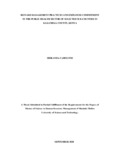| dc.description.abstract | Reward management serves thestrategic purposes of attracting, motivating and retaining employees who remain committed and enablethe organization to achieve itsgoals andobjectives. ThePublic health sector in Kenya has had numerous strikessince the sector was devolved to the county governments causing poor service delivery.This study aimedat assessing the effect of reward management practices on employee commitment.Specifically,the study sought to establish:the effect of: reward policies, reward criteriaandreward types on employee commitment. Further, it sought to establish the effect oforganization factors on the relationship between reward management practices and employee commitment.The study used descriptive surveyand correlationdesign.Thepopulation of thestudy was all nurses in thepublic health sectorinfourselected sub-countiesinKakamegaCountywhich constituted: 100 nurses from Butere,61 nurses inShinyalu,325 inLurhambi and95 inLugari.A total of 581 employees were targetedfrom whom a sample size of 234 respondents was drawn. .Kakamega County was chosen because of its vast population compared to neighbouring counties and the four sub-counties on the basis of capturing both rural and urban respondents. This study employedstratifiedrandomsampling in which the population was first divided into four sub-counties thereafter respondents were drawnin proportion to their original numbers in the populationusing simple random sampling technique.The studyused questionnaires that consisted ofstructured and unstructuredquestions.Qualitative data was analyzed by use of descriptive statisticswhich include the mean,standard deviation and percentages as well as inferential statisticssuch as multiple regressions. Thedata waspresented in frequency tables, percentages and reports.The study revealed a positive linear relationship between Reward management practices and employee commitment.The study showed that reward policy, reward criteria and both extrinsic and intrinsic rewardshave a significant and a positive effect on employee commitment in public health sector in selected sub-counties in Kakamega County, Kenya.Likewise, organizational factors have a moderating effect on the relationship between reward management practices and employee commitment in public health sector in selected sub-counties in Kakamega County, Kenya.Based on the findings of this study, it was recommended thata sound reward system should be developed to encompass the three reward management practices with emphasis on reward policy so as to gain their employee commitment.This study has implications for management of the public health sector in selected sub-countiesKakamega County, Kenya since they can influence employees to achieve optimized commitment by designing a good reward thatis perceived as fair, equitable and consistent. | en_US |

